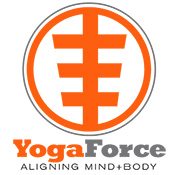
By Marcus Clarke, this week’s Guest Blogger for YogaForce. Marcus is from the UK.
7 Yoga Poses for Depression and Anxiety
Yoga can be a crucial tool in your fight against depression and anxiety. Due to its meditative nature, it’s perfect for alleviating the symptoms of both illnesses. There are many, many different yoga poses that could benefit your mental health, but here are 7 really great ones:
Matsyasana (Fish pose)
Sit upright on the floor, with your left foot on your right thigh and your right foot on your left thigh. Slowly, raise your back as much as possible while the top of your head touches the ground. Use your fingers to hold the toes of each foot. Matsyasana is scientifically proven to be effective and will calm your nervous system, allowing you clarity of mind while providing a rush of relaxation.
Balasana (Child’s pose)
With the big toes on both feet touching, sit on your heels. Make sure that your knees and hips are aligned. Gradually lean yourself forwards using your arms and lie on the ground with your palms facing upwards. Maintain the pose for roughly 4 minutes. This is a fantastic pose for de-stressing, stretching your back and relieving the tensions that has been built up in knots.
Virbhadrasana (Warrior pose) — Standing upright, turn your right leg facing outwards and put your left trailing behind you. Put your palms together while simultaneously lifting your hands upwards. Stretch. Switch legs and do the same again. As this pose is one of the most beneficial for inner and core strength, it’s integral for feeling strong enough to tackle your depression and anxiety. The physical boost will be replicated in your mind.
Dhanurasana (Bow pose)
This pose begins by lying on the floor, flat on your stomach. Curve your legs up towards your head by bending them from your knees. Arch your back and attempt to hold your legs in place with your hands. Dhanurasana is fantastic for your anxiety specifically, as it’s really effective at relieving headaches, stress, and even diabetes. It’s also a great a physical workout.
Parvatasana (Mountain pose)
For parvatasana, exhale while raising your tailbone and hip-bone to form an upside-down V. If you’re correctly positioned, your chest will be facing downwards. This is a great mood-booster, and will help to clear out the cobwebs in your mind and kick start your emergence from a depressive slump.
Viparit Dandasana (Chair backbend)
Sit on a folding chair with your knees bent. Slowly lower your back, ensuring that the chair doesn’t touch your shoulder blades. The part of your back just below your shoulder blades should touch the folding chair. Hold the back legs of the chair while simultaneously straightening your legs. As this pose is great for maintaining good posture, it’s vital for boosting the healthy mind-body relationship. The stronger your body, the stronger your mind will be. As viparit dandasana engages key muscles, the influence on your brain will be calming and instantaneous.
Sukhasana
This is the simplest, but possibly the most important and effective on the list. All this pose requires you to do is to breathe deeply with your hands folded. This is an incredibly meditative experience and allows us to improve our focus, our clarity of mind, alleviates depressive symptoms, and reduces stress and anxiety all at the same time.
The key to performing these movements with smooth transitions and ease comes down to executing proper alignment of the body. It is important to ensure that the correct body alignment is followed as this will help guard against potential injuries to sensitive areas such as the wrists and knees. The YogaForce A-Line Mat is the ideal yoga companion complete with indicative stripes to help you determine the correct body alignment for each pose. It also provides thick cushioning and boasts an antibacterial surface adapted for better grip – all while looking stylish and sleek. If you haven’t invested in a yoga mat yet, this is the best option to help you master the various positions in a safe – and trendy – way.
—
Guest Blogger, Marcus Clarke from Writerzone is a writer from the UK, regular blogs at psysci, psychology, science blog that examines the latest research and explains how findings can impact and improve people’s lives.







